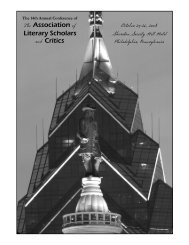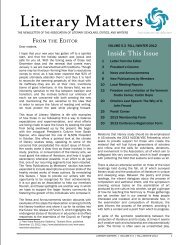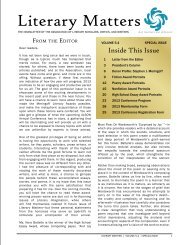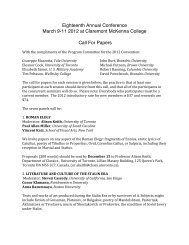he remained, I should still continue to be; <strong>and</strong> if all elseremained, <strong>and</strong> he were annihilated, the universe wouldturn to a mighty stranger: I should not seem a part <strong>of</strong> it”(ch. 9, 77). Heathcliff <strong>and</strong> Catherine define themselvesin terms <strong>of</strong> each other; they may not know what the rest<strong>of</strong> the world holds, but they know with certainty that theylove each other. This is a manifestation <strong>of</strong> the existentialidea <strong>of</strong> the other, the observer from whose perspectivean individual finds definition. Heathcliff knows himself,knows what is right, only insomuch as Catherine perceiveshim. This is, for a brief moment, a rock anchoring them,but soon this too crumbles <strong>and</strong> the two are left where theybegan: uncertain, <strong>and</strong> unhappy. The setting <strong>of</strong> WutheringHeights does not afford its characters the luxury <strong>of</strong>certainty; the novel begins with <strong>and</strong> is based on a searchfor absolutes that will give sense <strong>and</strong> direction to the lives<strong>of</strong> its characters.The crisis that precipitates the abrupt breakdown<strong>of</strong> this tenuous tranquility is a crisis <strong>of</strong> identity <strong>and</strong>authenticity; Catherine’s choice <strong>of</strong> Edgar over Heathcliffis a choice <strong>of</strong> the identity defined for her by others overthe identity she feels to be right, the identity she imaginesherself to have. She attempts to rationalize her decisionto Nelly; she enumerates the advantages <strong>of</strong> a marriageto Edgar, <strong>and</strong> declares that it would “degrade [her] tomarry Heathcliff” (ch. 9, 75). She has placed herself inchains, limited her own freedom in conforming to arbitraryexternal values. This is the sin <strong>of</strong> inauthenticity, whatSartre called mauvaise foi Catherine is doomed to sufferbecause she chooses as if she were not free to choose,<strong>and</strong> denies her own responsibility in creating her future.Heathcliff recognizes this, <strong>and</strong> refuses to forgive; hedeclares bitterly as she lies dying, “You deserved this. Youhave killed yourself” (ch. 15, 152). Catherine’s fall, thetragedy <strong>of</strong> her life <strong>and</strong> death, is the inevitable result <strong>of</strong>her denial <strong>of</strong> her freedom <strong>and</strong> <strong>of</strong> herself. Heathcliff’s ownunhappiness stems in turn from the way he has definedhimself; he claims he is Catherine, as she is him, butAll Kinds <strong>of</strong> Signs:his underst<strong>and</strong>ing <strong>of</strong> her is flawed. When she crumblesthen, when the woman she is fails to correspond tothe woman he wants her to be, he falls as well, like Jilltumbling after Jack. These problems <strong>of</strong> identity arethe misshapen products <strong>of</strong> Catherine <strong>and</strong> Heathcliff sfailure to underst<strong>and</strong> their freedom, <strong>and</strong> their ability tocreate themselves. Each acts as if there exists someideal Heathcliff <strong>and</strong> some ideal Catherine buried withinthe other; Catherine exclaims on observing Heathcliff’scruelty, “That is not my Heathcliff. I shall love mine yet... he’s in my soul” (ch. 15, 151). Heathcliff, meanwhile,derides Catherine as “cruel <strong>and</strong> false” (ch. 15, 152) <strong>and</strong>accuses <strong>of</strong> her <strong>of</strong> self-deception. He dem<strong>and</strong>s, “Whydid you betray your own heart?” (ch. 15, 152). Yet anexistentialist would argue <strong>and</strong> Brontë seems to suggestthat there is no betrayal <strong>of</strong> identity, there is simply thechoice. If there is a betrayal, it is a betrayal <strong>of</strong> freedom, adenial <strong>of</strong> responsibility. Catherine <strong>and</strong> Heathcliff are whothey have chosen to be, not who they imagine themselvesto be. Catherine is her choice to marry Edgar; Heathcliffis his deliberate cruelty. The tragic events <strong>of</strong> WutheringHeights are driven by the inability <strong>of</strong> its characters torecognize their freedom, their responsibility, <strong>and</strong> theirh<strong>and</strong> in creating the reality that tortures them.Hell is Catherine, Hell is Heathcliff; as the events <strong>of</strong>Wuthering Heights unfold, the characters find themselvessubmerged deeper <strong>and</strong> deeper in a seemingly inescapablesea <strong>of</strong> suffering, a riptide <strong>of</strong> existential angst. Emily Brontëhas created in this novel a visceral <strong>and</strong> painfully engagingworld empty <strong>of</strong> absolutes, <strong>and</strong> a despairingly true depiction<strong>of</strong> how individuals struggle to find their way in such gloom.Heathcliff <strong>and</strong> Catherine attempt to find something toanchor themselves in this uncertain storm; they fail. Theydeny their freedom, they reject their responsibility, <strong>and</strong> asa result, they suffer. Emily Brontë’s Wuthering Heights isa testimony to the struggles <strong>of</strong> human beings to find theirway, <strong>and</strong> their happiness, in a world without signposts. aSuperstition in The Adventures <strong>of</strong> Huckleberry FinnBy David Gore, Newton North High School (Newton, MA)Like the mighty Mississippi, the theme <strong>of</strong> superstitionruns strongly through Mark Twain’s Adventures <strong>of</strong>Huckleberry Finn. From the perspective <strong>of</strong> the wide-eyedyoung narrator, the reader is presented with a worldviewin which a kind <strong>of</strong> concrete, unquestioned magic holdssway. To look over your left shoulder at the new moon, topick up a snake’s shed skin, or to kill a spider is sure tobring bad luck, although what exactly that misfortune willentail is never explicitly defined. On the most basic level,characters’ fervent reliance on superstition is mined byTwain as a source <strong>of</strong> satirical humor. However, the authoralso uses the theme <strong>of</strong> superstition to address morepr<strong>of</strong>ound topics, such as race, religion, <strong>and</strong> the naturalworld. Throughout the novel, Twain draws attention to <strong>and</strong>pokes fun at the superstitions both <strong>of</strong> white characters,such as Huck <strong>and</strong> Pap, <strong>and</strong> <strong>of</strong> black characters, suchLITERARY MATTERS | VOLUME 3.4 | YEAR-END 2010 20
as Jim <strong>and</strong> Nat. In so doing, he highlights superstitionas an important, if not altogether admirable, aspect<strong>of</strong> the human commonality that transcends race. InTwain’s h<strong>and</strong>s, superstition becomes a tool in theoverarching argument against the myth <strong>of</strong> the superiority<strong>of</strong> reasonable, intelligent whites over backwards <strong>and</strong>irrational blacks. For example, Huck’s description <strong>of</strong> Natas a “good natured, chuckle-headed ... nigger” with “hishair ... all tied up in little bunches with thread .... to keepwitches <strong>of</strong>f” would appear to most modern readers as aracist caricature <strong>of</strong> an ignorant slave (178). However, atthe story’s start, Huck himself employs the very samesuperstitious precaution. After accidentally killing aspider, Huck says he “tied up a little lock <strong>of</strong> [his] hair witha thread to keep witches away” (3). Through such focuson both black <strong>and</strong> white superstitions, Twain underminesthe notion that an unsophisticated belief in magic is solelyor even primarily a black attribute.In fact, within Huck <strong>and</strong> Jim’s relationship, superstitionenables a shift in the st<strong>and</strong>ard racial paradigm. Oftenin the story—during the “King Sollermun” <strong>and</strong> “talkingFrench” debates, for example—Huck condescends toJim, affecting the stereotypical white traits <strong>of</strong> superiorintellect <strong>and</strong> education. His exasperated exclamation atthe end <strong>of</strong> these debates—that “it warn’t no use wastingwords—you can’t learn a nigger to argue”—is indicative <strong>of</strong>this patronizing attitude (60). Huck is seldom so blatantlycondescending, but he <strong>of</strong>ten attempts to take on the role<strong>of</strong> teacher. For example, he launches into a didactic, iffactually inaccurate, lecture on the nature <strong>of</strong> royalty, duringwhich he treats Jim, a grown man who must be nearly twicehis age, like a young child, talking down to his friend withsuch remarks as: “All kings is mostly rapscallions .... Youread about them once—you’ll see” (116). Strikingly, therealm <strong>of</strong> the supernatural is one <strong>of</strong> the few areas in whichHuck respects the judgment <strong>and</strong> experience <strong>of</strong> Jim, who,in Huck’s own words, “knowed all kinds <strong>of</strong> signs” (34).At the very start <strong>of</strong> the book, Huck respectfully consultsJim <strong>and</strong> his clairvoyant hairball for advice, even <strong>of</strong>feringthe slave a perfectly good counterfeit quarter to ensurethat the ritual functions properly! After the encounterwith the House <strong>of</strong> Death, even though Huck is bursting todiscuss what he’s just witnessed, he “didn’t say no more... about the dead man,” accepting Jim’s warnings that“it would fetch bad luck ... <strong>and</strong> ... [the dead man] mightcome <strong>and</strong> ha’nt [them]” as “pretty reasonable” (39). Incontrast to his superior attitude at other times during thebook, Huck’s reverence towards Jim’s opinions in matters<strong>of</strong> superstition st<strong>and</strong>s out as a truly noteworthy step in hisdeveloping attitude towards race.In Huck’s worldview, religion is no more than justanother superstition, <strong>and</strong> in fact, it is one in which hedoes not place much stock. This allows Twain to subtlydisparage religion, one <strong>of</strong> the major subjects <strong>of</strong> the novel’srich satire. From the very first pages, it is clear that Huckhas little to no regard for religion, seeing it as unrealistic<strong>and</strong> irrelevant. Upon learning that Moses, whom he waspreviously “in a sweat to find out all about,” is dead,Huck dismissively reflects, “I didn’t care no more abouthim; because I don’t take no stock in dead people” (2).Similarly, he disregards the ideal <strong>of</strong> religious living thatMiss Watson is trying to foist upon him. As Miss Watsonrhapsodizes about how “she was going to live so as to goto the good place,” Huck acknowledges that he “couldn’tsee no advantage in going where she was going, so [he]made up [his] mind [he] wouldn’t try for it” (2). His outrightdisdain for worship is further exposed when he labels aday spent with the Grangerfords discussing “faith, <strong>and</strong>good works, <strong>and</strong> free grace, <strong>and</strong> preforeordestination,<strong>and</strong> ... what all” as “one <strong>of</strong> the roughest Sundays [he] hadrun across yet” (83). In a humorous but telling illustration<strong>of</strong> the parallel between religion <strong>and</strong> superstition in Huck’smind, his reaction to Miss Watson’s prayer is almostidentical to his reaction to Tom Sawyer’s genies: heab<strong>and</strong>ons the idea <strong>of</strong> both when they do not produce thedesired results. When Huck’s attempts at prayer yield afish-line but no hooks, he gives up on faith after “threeor four times” (8). He “set down, one time, back in thewoods,” <strong>and</strong> decided <strong>of</strong> prayer: “there ain’t nothing init”(8). Likewise, after absorbing Tom’s fantastical tales <strong>of</strong>genies “as tall as a tree <strong>and</strong> as big around as a church,”Huck attempts to conjure a spirit for himself (11). In anepisode almost identical to the prayer scene, Huck “wentout in the woods,” but when “none <strong>of</strong> the genies come,”he declares that “all that stuff was only just one <strong>of</strong> TomSawyer’s lies”(11). Twain uses these correspondingvignettes <strong>and</strong> Huck’s frequent derision <strong>of</strong> faith tocharacterize religion as just as arbitrary <strong>and</strong> fanciful asany superstition.In a literary tradition that dates back to ancientmyths, the characters in The Adventures <strong>of</strong> Huck Finn usesuperstition in an attempt to comprehend a natural worldthat baffles them. From the first, nature is portrayed asmysterious, enigmatic, <strong>and</strong> even magical. In the novel’svery first passage concerned with nature, Huck describeshearing “an owl, away <strong>of</strong>f, who-whooing about somebodythat was dead, <strong>and</strong> a whippowill <strong>and</strong> a dog crying aboutsomebody that was going to die; <strong>and</strong> the wind was tryingto whisper something to me” (3). The passage in whichHuck <strong>and</strong> Jim gaze up at the stars, transfixed—perhapsthe most visually arresting episode in the book—sharesthe same feeling <strong>of</strong> awe <strong>and</strong> disquiet: “We had the sky,up there, all speckled with stars, <strong>and</strong> we used to lay onour backs <strong>and</strong> look up at them, <strong>and</strong> discuss whether theywas made, or only just happened” (90). When characterscannot comprehend a phenomenon in this inscrutablenatural world, they invent a superstition to justify it. In thestargazing scene, for example, Huck <strong>and</strong> Jim “watch thestars that fell, too” <strong>and</strong> “Jim allowed they’d got spoiled<strong>and</strong> was hove out <strong>of</strong> the nest” (90). This instinct forsuperstitious rationalization is used to comic effect whenthe Phelpses’ hounds burrow into Jim’s cabin throughthe tunnel Huck <strong>and</strong> Tom have dug <strong>and</strong> Nat, terrified,blames the incomprehensible event on witches. Thisurge to account for natural occurrence is so strong that,LITERARY MATTERS | VOLUME 3.4 | YEAR-END 2010 21







